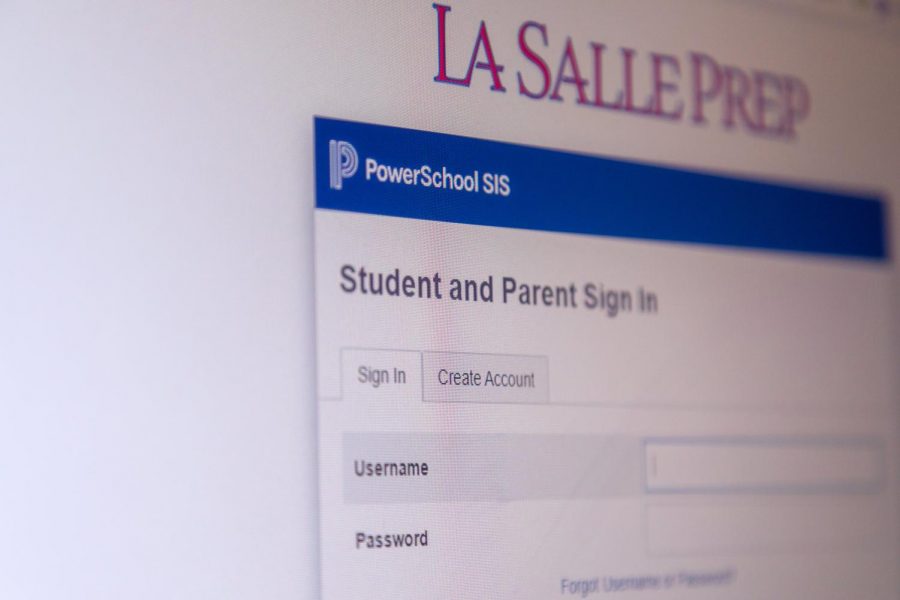La Salle Aims to “Continue the Learning Process” Despite Difficulty Created by COVID-19
“We need to recognize that while this isn’t ideal, we do have the capacity to keep learning,” said Ms. Alanna O’Brien, the Vice Principal of Curriculum and Professional Development.
April 29, 2020
The coronavirus pandemic and the sudden implementation of digital learning have had a profound effect on millions of students across the globe.
Students have had to not only learn new material through the screens of their iPads, but also retain the old, communicate over unfamiliar platforms such as Zoom, and aim to maintain passing grades.
After more than a month of acclimating to these unprecedented changes, a handful of La Salle students and staff spoke with The Falconer about how they are settling into the new reality.
Tests are unsecured. Science courses are unable to do hands-on labs. And most curriculum has inevitably been adjusted in order to prioritize what is most essential.
As part of the changes being made to the way students are learning, on Friday, April 24, Principal and President Mr. Andrew Kuffner announced that freshmen, sophomores, and juniors will conclude DLDs for the school year on May 29.
Seniors will finish with DLDs two weeks earlier than every other grade level on May 15.
After these dates, teachers won’t hand out any new assignments, and in place of finals as well as ‘dead week,’ students will be able to catch up on missed work if needed. Seniors will also be able to dedicate time to working on their portfolio presentations.
In an email to the La Salle community, Mr. Kuffner said, “to help students maximize their education this semester, we will provide additional time at year-end for course review, grade optimization, and credit recovery… allowing more time for individualized support and attention, especially for students struggling to adapt to the new learning environment.”
Junior Theo Desta was happy to hear about the absence of finals this semester.
“When I found out that finals weren’t taking place it was actually really stress relieving,” she said. “Given the circumstances, I feel that it would have been really difficult for not only students to take finals, but for teachers to administer them. I think this [will] affect my grades really positively because instead of stressing about exams and finals, I can have time to catch up on work and get myself in a good position academically.”
Sophomore Brin Brunkhorst echoed Desta’s ideas.
“I think that the school made the right decision because I can imagine the amount of problems taking place with doing finals digitally,” she said. “I am very appreciative that there will be no final exams and [instead] time to refine grades because I know that it has been harder to get good grades on assignments when you do not have direct teaching and the ability to ask questions of your teachers.”
During the process of deciding whether or not to cancel final exams, Vice Principal of Academics Mr. Mario De Ieso said that the administrative team “always [looks] at several scenarios and their potential outcomes before settling on a decision.”
If these tests were to take place, for example, students might have felt unprepared considering the switch to DLDs, and teachers would have had a hard time securely administering the tests from home.
For students whose grades would have likely benefited from finals, this might be concerning, but Mr. De Ieso said that “the aim is to… reduce the factors that may negatively impact students and so while we still will be issuing grades, we have looked at individual students’ situations to develop a plan to meet their needs and support them successfully through.”
In addition to the absence of finals, teachers have had to shorten their traditional curricula, requiring them to leave out important units or some of their favorite lessons.
English teacher Mr. Gregory Larson, for instance, had to choose between providing his freshmen students with a thorough grammar lesson or having them write an essay on poetry.
He decided on the essay—mostly because he thinks that those writing skills will be more useful to his students in the future, but he said that it would also be difficult to provide an at-home grammar test that is secure.
“[I] kind of made the call to make all my work individualized so that students aren’t ever turning in the same answer,” he said. “That obviously makes the grading take a lot longer, but it’s the most effective teaching I personally can think of… If I was giving out something where I was looking for the same answer from everyone, that would be tough. I think it’s got to be really difficult to be a math teacher.”
Additionally, Mr. Larson is no longer having his seniors read one of his favorite plays, “The Tempest.”
“If you think I was going to be successful in teaching Shakespeare exclusively through Schoology, to seniors, a month away from graduating, that’s just not going to happen,” he said.
“I’m dramatically changing the way in which I teach,” Mr. Larson continued. “With seniors, I’m cutting whole units and saying, ‘we’re not going to do any of that, we’re now going to do this instead…’ It’s hard for me to cut things because I work so hard to try and make units that I think are interesting. But in the interest of time and based on the feedback I’m getting from students and other staff members, it would not make sense to go forward with no changes.”
Math teacher Mr. Chris Cozzoli is in a similar situation to Mr. Larson, as he’s had to realign curriculum for some of his classes.
Out of the 11 units his AP Statistics students learn in a normal school year, they’re only reviewing nine prior to the AP exam.
And the seniors taking Mr. Cozzoli’s Pre-Calculus course will miss a unit that helps bridge them into the next level of math. However, students in the class who are not seniors will still receive this instruction, but in a more condensed way than usual.
Science teacher Mr. Kyle Voge’s Physics students, on the other hand, won’t have to miss out on any crucial lessons because of the way his calendar worked out—that is aside from the mechanics unit that he teaches at the end of the school year.
“All the Physics kids at La Salle kind of got lucky in terms of what they’ve already learned versus what is being cut out,” he said. “They’re not going to be impacted. At other schools across the state, they might be.”
Looking ahead, Mr. Voge isn’t concerned that skipping this curriculum will have a negative effect on his students.
“The stuff that kids will need to be successful in Chemistry and Biology, we got through all that before the DLDs hit,” he said. “This should not impact a kid’s ability to be successful in the next couple of years of science at La Salle.”
Mr. Cozzoli felt similarly.
“The little things that we know are going to be off a little bit—are just going to be topics that are sort of naturally covered in the next level anyway, so I don’t think those particular classes will have any long-term effects,” Mr. Cozzoli said. “[But] as a math department we’ve talked about [how] Algebra 1 is going to maybe miss a unit and Geometry’s maybe going to miss a unit… We’re just going to carve some time out of next year to make sure everybody gets the curriculum that they need.”
Even though the methods that students are using to learn have changed dramatically and some curriculum might be altered, Vice Principal of Curriculum and Professional Development Ms. Alanna O’Brien said that “our teachers have adjusted and many have shared new learning in using technological platforms that are working for them. We need to recognize that while this isn’t ideal, we do have the capacity to keep learning.”
As part of cutting finals and reorganizing some of the curricula, a few academic departments have adjusted the way that students’ grades are weighted.
Ms. O’Brien said that this shift was made in order “to de-emphasize summative assessments and give more weight to the learning process.”
As a result of all these circumstances and the overall switch to online learning, the effect on students’ grades has been varied.
“Grades, as I am sure students can attest to, have been impacted by the prolonged shift to distance learning,” Mr. De Ieso said. “Moving to DLDs to finish the school year has amplified the challenges many students were struggling with before we left campus.”
For students who are feeling challenged or having a difficult time, Ms. O’Brien said “the counseling team, and Mr. De Ieso, and our student support team are working relentlessly to reach out to any students who show signs of struggling.”
Brunkhorst said that her grades have gone down since shifting to digital learning.
“I have noticed that my grades have been doing worse than if I were in school,” she said. “I think that my grades will not fall too much by the end of the school year, but I personally do not feel that they will be as good as they were if I were still at school.”
For Desta, however, the switch has been beneficial to her grades.
“My grades have slowly started going up because DLDs allow me to work at my own pace and not feel like I’m in a stressful environment,” she said.
Despite the changes and unprecedented adjustments that students have experienced, the administrative team’s goal is to make these new learning methods as beneficial to students as possible.
“The focus of the staff and administration is on learning,” Ms. O’Brien said. “We want to prepare students for the next level or next year and not have students fall behind… We simply want to continue the learning process.”
In harmony with Ms. O’Brien, Mr. De Ieso added that “while we are always aware of how grades and testing may affect individuals, our focus as a faculty has been on doing what we can to ensure students are staying engaged and learning now more than ever.”





